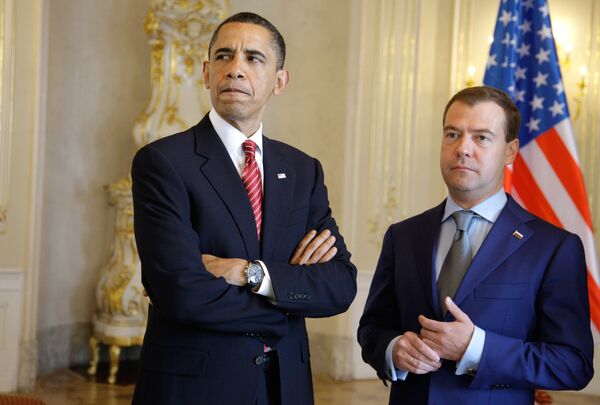Until their recent meeting in Deauville, Presidents Dmitry Medvedev and Barack Obama had not met face to face since the APEC summit in Yokohama, Japan last November. This six-month hiatus was only to be expected, given the particular way that bilateral relations between the two powers have unfolded.
It will undoubtedly be some time before any details on the exact nature of the agreements reached on missile defense become available. That is, supposing that Deauville saw any agreements reached at all, and that it was not just a convenient opportunity to continue the talks.
Obama, who is renowned for his oratorical gifts, had this to say after the meeting: "We continued our discussions around the issue of missile defense and we are committed to working together so that we can find an approach and configuration that is with the security needs of both countries, that maintains the strategic balance, and deals with potential threats that we both share."
Both countries' media write that the United States and Russia want two different things from missile defense. Washington wants absolute security from any missile attack, whereas Moscow wants to know for sure whether Americans have stopped preparing for a nuclear war against Russia. The two countries simply think differently and are talking about two different things, and they are unlikely to ever understand each other.
Medvedev and Obama, who have been working tenaciously to cut strategic and offensive weapons over the past two years, clearly have the stamina to reach an agreement on missile defense as well. Moreover, Russia has said more than once that the New START Treaty is worthless without an agreement on missile defense.
Other achievements of their meeting at Deauville include the U.S.-Russian joint statement on visa liberalization. Of course, the United States will not allow visa-free travel for Russians overnight, but maybe potential tourists from provincial Russia will no longer need to go to Moscow for interviews at the U.S. Embassy. Washington may approve multiple-entry visas for Russians, something the EU has already done.
Russia and the United States also agreed on Thursday to further cooperate in the fight against terrorism, in particular al Qaeda. This harkens back to the post-2001 era when the U.S. and Russian intelligence services really cooperated and people in both countries hoped for a strong friendship forged in a struggle against a common enemy.
Furthermore, the two presidents signed a joint statement on deepening cooperation in the cross-boundary Bering Strait region, including the expansion of interaction between the national agencies responsible for the specially protected natural areas in Alaska and Chukotka.
And lastly, Obama said the reset in U.S.-Russian relations paying off.
"Over the past two years, I think that we have built an outstanding relationship and, as a consequence, we've been able to reset relations between the United States and Russia in a way that is good for the security and the prosperity of both of our countries," he said at a news conference after his meeting with Medvedev.
Unfortunately, there is still no clear path forward in bilateral relations. As diplomats would say, there is no agenda. And efforts to formulate a new agenda for U.S.-Russian relations in the past few months have not yielded substantial results.
Coasting is not a problem in such a situation, but there is always the danger of ending up in a minefield. It is clear that these two new-thinking leaders honestly want friendly relations between their countries. But, as is often the case, the voters get in the way. Ordinary people may know little about politics but the two leaders need their support at next year's presidential elections.
It usually takes people years, and possibly even several generations, to stop seeing someone as an enemy, but accelerating the process could spoil everything in the current explosive global situation.
It would have been ideal if there were one pro-American party and one anti-American party in Russia, but doubts about a U.S.-Russian partnership do not run along party lines. Obama said we should help maintain a strategic balance between the two countries (like during the rule of Nixon and Brezhnev), but what about all the other aspects of our relations?
Unlike Russia, the American electorate is being split by many other foreign policy events, such as Barack Obama's call for a two-state solution that uses the 1967 borders as a starting point, and Israeli Prime Minister Benjamin Netanyahu response that these borders are "indefensible."
Even Democrats say Obama should not have raised the issue, although many think it is not Obama but Netanyahu who is betraying Israel.
In an even more unpleasant move for the people, the United States may decide to hold talks on the future of Afghanistan with the war-weary Taliban. Part of the U.S. electorate hates the idea, although it could be the only way out of this 10-year war.
In light of this, the current crawling pace of the U.S.-Russian reset could be conducive to progress. You know, "less haste, more speed."
The views expressed in this article are the author's and do not necessarily represent those of RIA Novosti.



